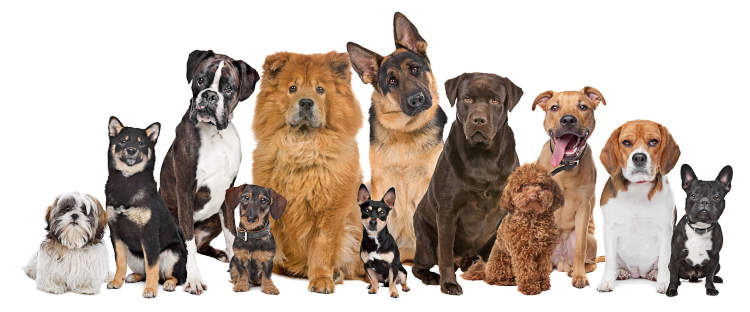Getting a new pooch is exciting and exhilarating, but can also be stressful, all at the same time. On one hand you can’t wait to get the fur ball home and learn all its personality quirks. Anyone who’s had a dog knows the joy of reflecting on the memories of those first few days when everyone was first getting to know each other.
At the same time, you’re making a commitment to look after and share your life with a special being, a living creature who will rely on you its whole life. As such, this kind of commitment requires a good amount of thought and planning.
With so much to think about when looking to get a dog, it’s a little too easy to forget some essential details. Details like what kind of dog will truly integrate smoothly into your life and home can often be put aside, replaced by an urge to pick a breed and dog which you may view as the most adorable. While all dogs are wonderful, they’re not all created equal, and the decision of what kind of dog to bring into your life is not one to be made lightly.
The first key to becoming a responsible dog owner is to consider all the relevant factors to picking the right dog, to ensure that you connect with a dog that is a great fit for your home, life and for your family. When you take your time to make the right decision from the start, you’ll be rewarded with a beautiful partnership and a long and happy life together with your special pal.

Why Does the Breed Matter?
You may wonder why the breed of dog matters. While it’s true that every dog has a unique personality, it’s undeniable that different breeds have distinct characteristics.
We have bred dogs with a strong purpose in mind for hundreds of years. You won’t be able to guarantee a particular kind of pet by shopping according to breed, but you’ll definitely increase your chances of a successful match. This advice applies to anyone getting a dog, even if you’re planning on adopting a mixed breed pet from a rescue. It’s best to educate yourself on the well-known aspects of those breeds before making the commitment.
Suggested Reading: Top of the Dogs: 30 Popular Dog Breeds and Their Key Facts
What’s Your Home Like?
Your living environment is one of the major factors to consider when researching the ideal breed. Naturally, a larger dog will be more comfortable in a bigger home. You’ll be more comfortable, too! But having a smaller space doesn’t mean you can’t have a large dog.
Great Danes, for example, often thrive in an apartment space. They have a low energy level, whereas a dog like a Labrador Retriever is sometimes too rambunctious for an apartment. If you have a fenced yard, that makes a smaller living environment more flexible. Keep in mind how “busy” your home operates. If you have small children, or if people are constantly coming in and out, you’ll want a more tolerant dog.
Some breeds, like Chow Chows, are frequently bothered by chaotic households. If you live in a residential complex, you will probably look at different breeds than someone on a farm property. This can even be a legal requirement.
Townhouses and condos often have restrictions on both the number and size of accepted dogs. Rural accommodations allow for more freedom in both the size and temperament of a dog.

What’s Your Lifestyle?
Take a moment to consider your lifestyle. Your daily routine can be complemented with a suitable pet, but the wrong match will tear it apart. By noting the style of your life, you can make sure a potential dog will mesh well within it.Some factors to consider include:
-
- Your Energy Level – Are you a couch potato who loves binging your latest TV show? Or do you live for getting a daily runner’s high after work? If you hate going for walks, a lively Beagle will not be the ultimate canine partner for you. You’re more apt to find a couch buddy in a Bulldog or pet of similar energy.
- Your Work Hours – In truth, there’s no dog that wants to be left home alone all day. However, there are dogs who are better suited to people with busy schedules. A Basset Hound, for example, will be more content to hang out inside while you’re at work than an active Australian Shepherd.
- Your Travel Preferences – It’s still possible to own a dog even if you’re a travel junkie. If you’d like to bring your pup exotic places, search for a dog with an adaptable personality and a small frame. A Bichon Frise is a popular choice for travelers. With small dogs, you can bring them right on the plane with you.
- Your Spare Time – Some dogs are just more work than others. Even a dog with a lovely personality can end up being very demanding of your time. A Border Collie, for example, is the kind of dog that needs something to do at all times. If you don’t have the energy and the time to keep them busy, they’ll end up accidentally torturing you.

What’s Your Previous Experience with Dogs?
The basics of dog ownership and training are universal, but some breeds are just better “first-timer” pets. If you’re new or inexperienced, save yourself a headache by getting a pet with a more forgiving temperament.
Some favored “beginner” dog breeds include the Maltese, Golden Retriever, and Cavalier King Charles Spaniel. On the other end of the spectrum, some dogs are infamously challenging to train. This doesn’t mean they are “bad” dogs. It just means you might need more advanced tools to cohabitate peacefully with them.
If you’re brand new to dogs, you may want to steer away from these tough pups. Dalmatians and Afghan Hounds are two examples of dogs that can be tricky to work with in the beginning.

How Much Time Do You Want to Spend Grooming?
Grooming might not seem like a big deal, but it can eventually take a significant toll on both your time and finances. Some dogs, such as Chihuahuas, are simple to maintain. They require a little brushing and nail-trimming, but it will not take you long.Meanwhile, other dogs will have you going to a professional groomer regularly.
Old English Sheepdogs, for example, require consistent grooming. A more extreme example is the Puli, a Hungarian dog with a high-maintenance, corded coat. If you don’t mind spending the necessary time, these are all still tremendous pets to have.

Are You Prone to Allergies?
Speaking of hair, make sure you acknowledge your tolerance to dog hair and dander. If you didn’t grow up around dogs, spend some time with them before getting your own.
You can enlist the help of a dog-owning friend or spend some time at the local shelter. You can also visit an allergist and get a comprehensive test done. The last thing you want is to get your new pal home and discover too late that you are unbearably allergic.
People with only mild allergies can still experience the pleasure of dog ownership, especially after taking precautions. Using an air filter, frequently washing your hands, and minimizing contact with the hair/dander can all help immensely.
You can also talk to your doctor about a prescription medication to ease your symptoms during flare-ups.
If you’re prone to allergies, research the kinds of dogs that are less likely to trigger a reaction. No dog is completely hypoallergenic, but many breeds are better suited to allergy sufferers. Poodles and Poodle crosses are probably the most well-known examples.

What Traits Are You Looking For?
Although personality is highly dog-dependent, it’s wise to study the dominant character traits of potential breeds. You’ll have a better chance of a long-lasting and mutually beneficial relationship if you consider compatibility beforehand.
Here are some traits to consider:
-
- General Temperament – How important are temperament qualities to you? Would you rather have an aloof protector or a goofy cuddle-monster? It doesn’t necessarily have to be one or the other, but think about what you want to prioritize.
- Vocalizations – Will it drive you crazy if your dog likes to whine, howl, or bark excessively? Some breeds are much more vocal than others. Generally speaking, if you treasure a quiet home, don’t opt for a chatty terrier type.
- Sense of Purpose – Certain dogs are hard-wired to do a job. Australian Cattle Dogs, for example, love to herd and will go a little crazy with no outlet to do so. Think about what your dog of choice was originally bred for and if you can accommodate the innate drives that accompany that.
- Sociability – Socializing a dog is the best way to set them up for a friendly public demeanor, but that job is just naturally easier with some breeds. Spaniels, especially Springer Spaniels, are well known for their friendly nature.
Research is Key
If there’s one thing that should be clear by now, it’s that every breed comes with special pros and cons.
Every dog, person, and home have a unique set of needs and requirements. It’s critical to look objectively at your own circumstances and then figure out what kind of dog would flourish in those conditions.
Many dogs end up abandoned in shelters just because they weren’t quite the right fit for a home. Even though studying all of this is a time-consuming task, it’s worth it in the long run. When you have a happy, tail-wagging dog to come home to every day, you’ll be glad you did your research.






